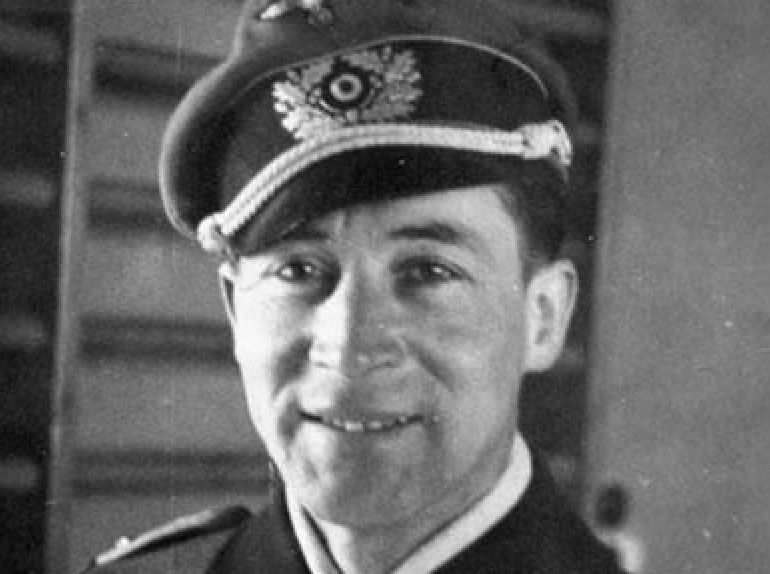
Wilm Hosenfeld was a German army officer who rescued several Jews during the Nazi occupation of Poland, including the famous pianist Wladyslaw Szpillman.
Wilhelm Adalbert Hosenfeld was born in Hesse, Germany in 1895 to a pious Catholic family. Charitable activities were a big part of his childhood. He joined the Wandervogel movement, a German wilderness youth group that was a precursor to the hippie movement (Wandervogel was outlawed by Hitler in 1933.) Wilm fought for Germany during World War I and was severely wounded in action. He received the Iron Cross Second Class.
After the war, Wilm got married in a traditional Catholic ceremony and he and his wife, Annemarie, had five children. The family settled in Hunfeld and Wilm worked as a schoolteacher. Annemarie was a pacifist and peace activist who influenced him enormously. In 1939, when Wilm was 44 years old, Wilm was drafted by Hitler into the Wehrmacht, the German army. Stationed in Poland, he oversaw the building and running of a POW camp. He was moved throughout Poland and finally, in July 1940, where he stayed for the remainder of the war. Wilm had an interesting assignment: he was in charge of sports events at the Warsaw Army Stadium.
In the 1930’s, Wilm joined the Nazi party, convinced that nationalist policy was the best for Germany. But once he arrived in Poland in 1940 and saw the brutality, he quickly became disillusioned. He read Mein Kampf and was shocked to learn the truth about Hitler’s ideology.
He was horrified at how his countrymen were treating Poles and Jews. Being German, once a source of pride, felt like an embarrassment. Wilm looked for ways he could be helpful to the victims of his own army’s persecution. The first Jew saved by Wilm was Leon Warm, who’d escaped from a train headed to death camp Treblinka. Wilm procured false identity documents for Warm, and gave him a job in the sports stadium. One day Wilm was riding his bike through the Polish countryside when he saw a pregnant young Jewish woman running in great agitation. He followed and learned that her husband was in a concentration camp. She begged him for help, and he wrote down her husband’s name and promised that he would be home in three days. Nobody knows exactly what transpired, but Wilm kept his promise. Another time, he learned that the brother-in-law of a priest who was active in the Polish resistance was being taken to an extermination camp. Wilm located the truck, flagged it down, and told the S.S. officer that he needed a man for his labor crew. He “randomly” selected the priest’s brother-in-law, saving his life.
After the Warsaw Ghetto uprising in 1943 was brutally suppressed by the Nazis, Wilm wrote “… these animals. With horrible mass murder of the Jews we have lost this war. We have brought an eternal curse upon ourselves and will be forever covered with shame. We have no right for compassion or mercy; we all have a share in the guilt.”
A year after the ghetto uprising was the Warsaw uprising, a well-organized attempt by the Polish resistance to liberate Warsaw from the German occupation. This uprising also was quashed, and all Poles were kicked out of the city. As a German officer, Wilm stayed in Warsaw and encountered an unexpected survivor of the uprising. Wladyslaw Szpillman was a well-known Jewish pianist whose entire family had been deported to Treblinka. Wladyslaw avoided the same fate when the police officer overseeing deportations recognized him and allowed him to escape. The musician took shelter in the bombed-out shell of a building in Warsaw, trying desperately to cling to life despite the lack of food and heat. In November 1944, Wilm encountered Wladyslaw near death and provided the pianist with food, supplies, and safety from arrest. Wilm saved Wladyslaw’s life, enabling the composer’s prolific career composing and performing until his death in 2000 at age 88. Wladyslaw’s story, and Wilm’s crucial role in it, were dramatized in the acclaimed film “The Pianist.”
When the war ended, Wladyslaw was one of only twenty Jews left in Warsaw (before the war, 375,000 Jews lived there, 30% of the population.) Wilm surrendered to the Soviets along with the men he was commanding. Despite his renunciation of Nazism and heroic actions, the Soviets convicted him of war crimes for being a German officer, and sentenced him to 25 years of hard labor. In 1946 he wrote to his wife, begging her to track down the Jews he’d saved and ask them to testify on his behalf. She was able to find Wladyslaw and he agreed to help but unfortunately it did no good. Tragically, Wilm Hosenfeld died in a Soviet POW camp on August 13, 1952 having suffered a ruptured thoracic aorta. Wolf Biermann wrote about Wilm’s sad death: “He had been tortured in captivity… he then suffered several cerebral strokes. By the end he was in a confused state of mind, a beaten child who does not understand the blows. He died with his spirit utterly broken.”
After Wilm’s death, the Szpilman and Warm families advocated for decades for him to be honored as Righteous Among the Nations, and Wilm Hosenfeld finally received that designation in 2008, His children proudly accepted the award on his behalf.
For following his conscience rather than unjust orders and saving lives, we honor Wilm Hosenfeld as this week’s Thursday Hero.
Get the best of Accidental Talmudist in your inbox: sign up for our weekly newsletter.